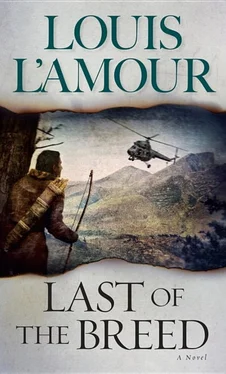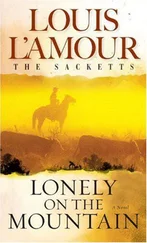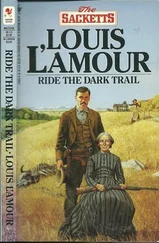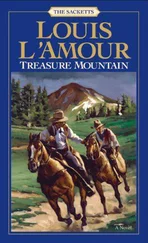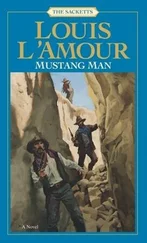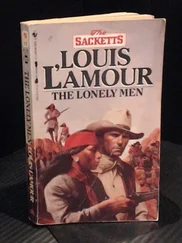Louis L'Amour - Last of the Breed
Здесь есть возможность читать онлайн «Louis L'Amour - Last of the Breed» весь текст электронной книги совершенно бесплатно (целиком полную версию без сокращений). В некоторых случаях можно слушать аудио, скачать через торрент в формате fb2 и присутствует краткое содержание. Город: New York, Год выпуска: 2010, ISBN: 2010, Издательство: Random House Publishing Group, Жанр: Триллер, Историческая проза, Приключения про индейцев, на английском языке. Описание произведения, (предисловие) а так же отзывы посетителей доступны на портале библиотеки ЛибКат.
- Название:Last of the Breed
- Автор:
- Издательство:Random House Publishing Group
- Жанр:
- Год:2010
- Город:New York
- ISBN:978-0-553-89935-1
- Рейтинг книги:3 / 5. Голосов: 1
-
Избранное:Добавить в избранное
- Отзывы:
-
Ваша оценка:
- 60
- 1
- 2
- 3
- 4
- 5
Last of the Breed: краткое содержание, описание и аннотация
Предлагаем к чтению аннотацию, описание, краткое содержание или предисловие (зависит от того, что написал сам автор книги «Last of the Breed»). Если вы не нашли необходимую информацию о книге — напишите в комментариях, мы постараемся отыскать её.
Last of the Breed — читать онлайн бесплатно полную книгу (весь текст) целиком
Ниже представлен текст книги, разбитый по страницам. Система сохранения места последней прочитанной страницы, позволяет с удобством читать онлайн бесплатно книгу «Last of the Breed», без необходимости каждый раз заново искать на чём Вы остановились. Поставьте закладку, и сможете в любой момент перейти на страницу, на которой закончили чтение.
Интервал:
Закладка:
Finding a large, lightning-struck tree with a hollow trunk, he went inside, built a small fire, and made tea. Then he curled up to sleep. Two hours later, his fire out, he was awakened by the cold, and he started out once more, walking swiftly.
He ran the next twenty miles in almost marathon time, rested briefly, and started again at a much slower pace. By sundown of the following day he had found an overhang in the side of a rocky outcropping where he rested and ate. He had traveled almost seventy-five miles since leaving Peter Petrovich. Building a small, well-hidden fire of dry, smokeless wood, he slept for four solid hours.
The small mountain on which he had camped was bounded by swamp on both the north and east. There was a river on the north also. He could barely make it out beyond the swamp, which extended for miles.
He judged himself to be less than fifty miles east of Kurun-Uryakh and its airport.
In the evening he would start once more, following this river at a safe distance until it flowed into the Maya, as it undoubtedly did.
Three times during the day planes flew over, and once a helicopter working a search pattern went up and down across the country. Once, in the distance and beyond the river, he believed he saw a party of soldiers. Without a field glass he was unable to tell, but they appeared to spread out in a skirmish line, working up through the woods and across the country. From the map taken from Peter Petrovich, he was sure the river was the Nudymi. Shortly before sundown, he watched an elk cross the swamp and the stream and marked the route it took.
Wearing his elk-soled moccasins, he went down and followed it, starting just after sundown when there seemed to be nobody about. His bow ready, he crossed the swamp and the river and then followed it downstream. By daylight he had reached the Maya. Keeping under cover he worked his way north, seeking a safe place to cross to the other side.
Four days later he hid out in a hastily made shelter near the headwaters of the Del’ku River.
For two days he had eaten nothing, and the cold was bitter. To remain alive he must have food. To starve in warm weather was one thing, in cold it was impossible. Without food to fuel his body, the heat would quickly disappear and he would freeze. From the side of the mountain he could look over a small, sparsely wooded valley. Downstream the forest became thicker. All day long he had seen no animal tracks, nor any sign of human habitation. At the same time, he knew he was not far from some mining camps.
There was less snow now that he was moving away from the coastal mountains. Much of the earth was frozen hard and bare of snow, and where it existed it was often no more than a thin veil. From now on, snow caves would be rare.
He could not remember a time when he had not been cold, and when morning came he stumbled out on numbed feet. Long ago he had taken to putting dry grass in his moccasins as a partial protection. Now he plodded on, hungry, very tired, his faculties dulled by cold.
Forty miles behind him, Alekhin and six men came down to a small river. One of the men who had scouted on ahead returned to report. “No tracks,” he said. “Nothing but elk around here.”
Alekhin ignored him. He looked around thoughtfully, then walked toward an opening in the woods. He’s been running now for months, he told himself. He will become careless.
He studied the tracks. “You are a fool,” he said to the soldier. “No elk passed here.”
“But the tracks! Right there before you.”
“They are the tracks of a man wearing elk hoofs. See the stride? And he has passed by plants where an elk would browse.”
The soldier was unconvinced. “But how could he—?”
Alekhin ignored him. He started on along the trail, but as they neared a patch of woods he motioned to the soldier. “You go first. You will learn about a trail.”
Also, he told himself, if there is a trap you will be caught, not me. And sooner or later there will be a trap.
Yet when it came, even he was surprised. The elk tracks had been replaced by those Alekhin recognized as those of the American. He was hurrying now, running, taking much longer strides, and the river was before them. The soldier began to hurry, led on by the tracks.
The others followed, Alekhin last. Stopping, he turned to look back the way they had come. He was puzzled. The American had held a fairly true course, so why had he suddenly turned now? Glancing through the trees, Alekhin saw the river and a patch of snow-drifted ice. The soldier was headed right for it.
The fool! Didn’t he realize it was a death trap? That the ice beneath the snow could never be trusted? Did he not know that snow would act like a quilt or blanket and warm the ice beneath and that the running water would eat away the ice?
Alekhin shouted and then shouted again. The soldier, with his earflaps down, did not hear him. He could see the American’s tracks leading down to the riverbank, and he could even see a track in the snow before him. Alekhin shouted again and started to run. The others heard him, and he shouted, gesturing. They did not understand, and the lead soldier knew he was safe. He could see the tracks ahead of him and where—
His boot went through the drifted snow, through the spongy ice, and into the water. He fell forward, screamed, and went into the water.
“Stay back,” Alekhin said. “Do not go near him or you will go through.”
“But we must save him!”
A soldier started forward, but Alekhin grabbed his arm and jerked back. “You cannot save him. He is dead.”
“But I can see! He is alive! I—!” He tried to jerk free.
“It is more than sixty below zero,” Alekhin said. “In the water he will last a minute or two. He is soaked now. If you bring him out he will freeze instantly. There is nothing we can do.”
The soldier was struggling to get out on the ice. He fought madly, then rolled out on the ice. The others started forward. “You will go through,” Alekhin warned.
They stopped. Their comrade was no longer moving. “He is dead,” Alekhin said. “It was a trap.”
They huddled closer around him. “A trap? But the American went that way. We saw his tracks.”
“A track at the edge of the ice and a smeared place or two ahead of him that looked like tracks. Probably it was done with a long pole or branch to make it appear he had gone that way.”
Alekhin turned away, his eyes searching for the real trail. “He knew what he was doing. He knew he could kill one or more of you.”
They shivered in the bitter cold and looked at the stiffened body of their mate.
“What about him?”
“He is dead. You can do nothing for him. If you try to reach him, you may break through as well.”
They walked away and he said, “If you just get a foot in the water, get it instantly into the snow. Dry snow is the perfect blotter. If you get soaked there is no chance.”
It was cold… cold.
A soldier turned and looked back. His mate lay, a stiffening gray thing upon the river ice.
Numb and frightened, the soldier followed Alekhin.
Chapter 28
Stephan Baronas stood beside his daughter and waited. Fear choked him, but he fought it back. The man who got out of the Volga was a large, strong-looking man, and he strode over to them. For a moment he just stared at them.
“Can we go inside?” he asked them. His tone was mild.
“Please do,” Baronas said. “Forgive me. We do not often have visitors.”
Inside, the man took off his heavy coat and hat. He looked around him. “Snug,” he said, “and warm.” He looked from one to the other. “You are comfortable here?”
“Yes.” Baronas was surprised at the question. “Thank you.”
Читать дальшеИнтервал:
Закладка:
Похожие книги на «Last of the Breed»
Представляем Вашему вниманию похожие книги на «Last of the Breed» списком для выбора. Мы отобрали схожую по названию и смыслу литературу в надежде предоставить читателям больше вариантов отыскать новые, интересные, ещё непрочитанные произведения.
Обсуждение, отзывы о книге «Last of the Breed» и просто собственные мнения читателей. Оставьте ваши комментарии, напишите, что Вы думаете о произведении, его смысле или главных героях. Укажите что конкретно понравилось, а что нет, и почему Вы так считаете.
